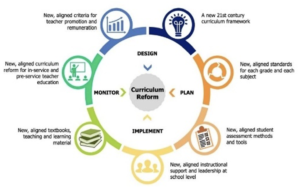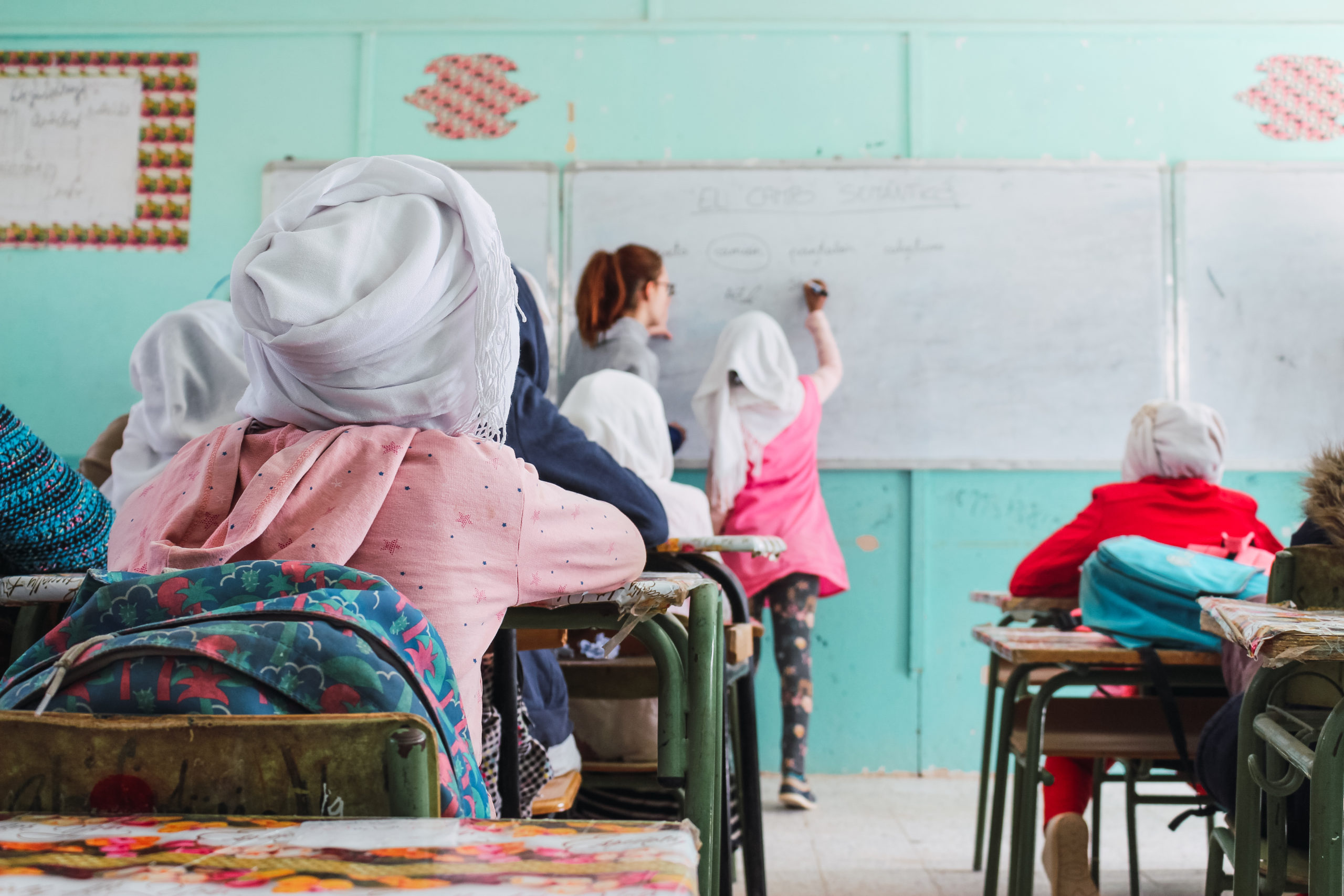Evidence for Education Policy Reforms: Between Global Agendas and Local Reality
In this blog post, Rasha Sharaf draws on her own experience to contribute to the discussion on the tension between local reality and global agendas in the use of evidence for education policy reforms.
In this blogpost, I am sharing my experience with international development projects in the MENA and South Asia regions where I had the chance of working and providing consultations in more than 15 countries in collaboration with international organizations like the World Bank, UNESCO, OECD and KIX EMAP Hub. I stood on one or both sides of the international collaboration formula representing global agendas – often strongly shaped by “Western” knowledge (what some might call the “Global North”) – and the local or regional expertise (what some might call the “Global South”). International collaboration and the policies and strategies of international agencies have been informed by Western theories of globalization and modernization that tend to be at odds with realities on the ground. Evidence for policymaking is all too often shaped by global agendas and Western knowledge rather than by local conditions, experiences and applied research.
International References and Simplistic Policy Transfer
In some cases, international aid policies already have pre-set targets that align with their mandate and priorities which might be alienated from the local needs for education reform. Hence, the process of needs assessment is critical to identify urgent needs. This is why baseline studies are of great importance in guiding the type, scope and approach to education policy support. You can explore a few baseline studies here:
- Scoping study on gender equality and social inclusion | GPEKIX
- Education System Resilience: GPE KIX Scoping Study Working Paper | GPEKIX
Baseline or scoping studies help identify most persistent needs through surveys that target beneficiaries and stakeholders. In this way, educational priorities are identified within a certain context. Policy transfer between neighboring countries with comparable cultures and socio-economic systems also holds potential of success.
World Bank, OECD and UNESCO reports are among the leading policy reference documents used in the Global South. PISA country reports of those who are scoring higher in PISA exams (such as Hong Kong, Finland, New Zealand) are regarded as the “constitution” for policy reform policies in other contexts. It is a very common practice that policy makers believe they will need to provide an international benchmark for policy endorsements by their government. In evidence-based policy uptake, is it common to embrace syllogisms such as: If shortening school days in Finland has worked well without jeopardizing quality, it should similarly work in other countries. This overgeneralization overlooks the difference in the countries in question which needs to be considered in policy transfer. I would like to illustrate these tensions between global agendas and local realities with two examples from my own experience.
As a UNESCO consultant coming from a MENA background, I was involved in developing the Iraq National Education Strategy 2021 – 2030 (INES). In the “sector analysis” phase, which is now commonly referred to as “system analysis”, local experts reviewed applied research for educational policy interventions that worked within the Iraqi context, but because of conflict and damage of most universities and research centers, very limited research findings were available. Hence, we had to rely on western evidence-based policy options. Even Education Sector Plan (ESP) targets were intensely affected by western “trends” such as international rankings and league tables. In a post-conflict context, providing access and equity is far more important than looking at rankings. When access aspirations were too high, especially with regard to strategies to bring the Out-Of-School-Children back to school, feasibility testing proved that available human resources in terms of numbers and qualifications of teachers, would not suffice. Hence, relevant policies were adopted for this specific situation where a considerable number of administrative staff received capacity building to shift their career to teaching. A complementary program was to conduct applied research that can lead future evidence-based policy making in the country. Here, UNESCO was the knowledge broker that helped mediate western knowledge to the specific needs of the education sector in Iraq. Recruitment of local experts was a sustainability prerequisite to ensure the education sector plan implementation, monitoring, evaluation and learning (MEL) and follow-up. Follow-up studies and monitoring reports will indicate the effectiveness of these endeavors.
Another example from the Maldives illustrates how the KIX EMAP Learning Cycles supported policy reform and the use of research evidence for policy decisions.
Between 2021 and 2023, three teams from the Maldives were enrolled in three KIX EMAP Learning Cycles on the use of geospatial data and on the integration of the 21st century skills in curriculum and teacher professional development. All three Learning Cycles led to policy uptakes. Learning Cycles were concluded by a country knowledge report that provided policy recommendations from the local experts’ perspective. The Maldives report on equity using geospatial data provided evidence that students in many atolls/provinces did not have access to higher secondary education (equivalent to high school or secondary education). As this was a challenge that was not seen by policy makers, it was debated whether all atolls should offer higher secondary education for their students. But given that the country cannot afford to immediately build several new schools, the decision was taken to provide access within the existing lower secondary school. In the case of the Maldives, the use of geo-spatial data was based on global trends and agendas, mediated by IIEP/UNESCO, ACER or TPD@SCALE KIX project as knowledge brokers that was then adapted by the local experts, resulting in successful policy uptake.
Strategies for More Inclusive, Democratic, and Rational Policy Decisions
These two examples from Iraq and the Maldives demonstrate the challenges of uptake of research evidence for policy decisions. To make education policy decisions more inclusive, democratic, and rational, several key approaches can be employed. Here, I would like to propose the following approaches for discussion:
- Systemic Transformation: Partial or fragmented policy reforms (known as patchwork reforms) have proved ineffective.
 Hence, systemic transformation is to be considered. This diagram developed by Gita Steiner-Khamsi exemplifies a system transformation approach for a curriculum reform strategy:
Hence, systemic transformation is to be considered. This diagram developed by Gita Steiner-Khamsi exemplifies a system transformation approach for a curriculum reform strategy: - Stakeholder Engagement: It is critical to involve a wide range of stakeholders, including government, civil society, development partners, academia and research, in the decision-making process. This ensures that diverse perspectives and needs are considered.
- Evidence-Based Policymaking: The use of empirical data, research findings, and evaluations is needed to inform policy decisions. Then, pilot programs should be run to test new policies on a smaller scale before full implementation. This allows for adjustments based on feedback and outcomes. This is to be followed by exploring how results of piloting could be scaled up using applied research.
- Inclusivity in Policy Design: Policy design needs to address inequalities in education. This includes considering the needs of disadvantaged groups, such as students from disadvantaged socio-economic backgrounds, disabilities, rural communities, and minority populations. It is equally important to ensure that policies respect and incorporate local cultural values and practices, which can help increase acceptance and effectiveness (Budginaite, Sternadel & Siarova, 2016).
- Capacity Strengthening (Rather than “Capacity-Building”): Ongoing professional development is required for policymakers to enhance their ability to make informed, rational decisions, while not underestimating their prior experience and capabilities. This is why a few international organizations and programs are keen to incorporate capacity-strengthening components in support of member or partner countries and governments.
I truly believe that Western knowledge and global agendas can be very valuable and based on decades of experience and applied research for best practices worldwide. It is then the role of knowledge brokers and local experts (representing key stakeholders, including government) to adapt and pilot such knowledge for their local context to reach the best possible policy formula that allows for scaling up and system-wide implementation with the highest possible success rate.
About the Author:
Rasha Sharaf is Professor of International and Comparative Education and Education Administration at Helwan University and Knowledge Lead, for South Asia, the Middle East and North Africa, KIX EMAP Hub. She has recently been appointed as Secretary General for the Education Development Fund (EDF) in Egypt. Contacts: rsharaf@edu.helwan.edu.eg / rasha.sharaf@graduateinstitute.ch
This work was supported by the Geneva Graduate Institute’s UNESCO Chair in Comparative Education Policy.


Wow, this is such an important topic! I love how professionally you’ve explained all sides of it. This is just what we always expect from you, Professor Rasha👏👏
Amazing article discussing very important theme, so many useful information in one article, thanks for your great efforts professor Rasha 🌷
This translation was software-generated and errors may appear: A very interesting blog post that highlights the tension between global agendas and local realities in education policy-making. I find it particularly impressive how you point out the need to adapt international approaches to local circumstances rather than blindly adopting them. Your examples from Iraq and the Maldives illustrate this very well.
Question: How could you improve the process of adapting global education strategies to local needs in Egypt to promote sustainable development?
This topic of what works across various contexts is so important, particularly for the “Global South”, which is arguably at the mercy of global agendas and international aid. Thank you, Rasha, for this insightful piece, especially the strategies for fostering more inclusive, democratic, and rational policy decisions.